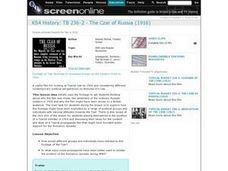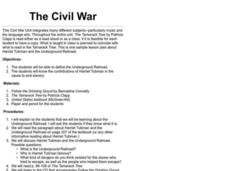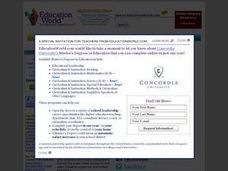Curated OER
Resources for Teaching Women Writers
Twelfth graders explore, discuss and experience a wide variety of texts from around the world written by women. They analyze the different genres covered and view a lot of unique point of views from different female perspectives. Topics...
Curated OER
WWI and Russian Revolution
Students view and discuss footage of Tsar Nicholas II reviewing troops on the Eastern Front in 1916 and examine how different groups would have reacted to this footage of the Tsar. They watch the video and in small groups answer...
Curated OER
You Must Still Think Yourself, CAS Can Only Help
Have the class learn about and make conjectures about a line intersecting a cubic. In this making conjectures about a line intersecting a cubic lesson, learners draw lines that intersect a cubic at three different points. Students...
Curated OER
Stem Cell Research Policy Lesson Plan: Create an Advocacy Brochure
Students after researching the science and the controversy around stem cell research, students create brochures to display their knowledge and a point of view.
Texas Instruments
Exploring Tangents
Explore the concept of tangent lines. In this tangent line lesson, learners graph a circle and two lines on their graphing calculator using Cabri Jr. High schoolers construct the lines so that they both intersect at a given point and are...
Curated OER
Marine Protected Areas
Students role play different stakeholders perspective on the debate about Channel Islands. In this marine science lesson plan, students identify different types of Marine Protected Areas. They research about their stakeholder's point of...
Curated OER
Coca Cola vs. People of India
Students study the presence of Coca Cola in India and what it has done to the water supply there. Students research web articles. They compare and contrast diverse cultural points of view. Students participate in a mock trial to...
Curated OER
Indianapolis 500 Unit -- Writing
Fourth graders write a narrative from a race car driver's point of view. In this narratives lesson students use the narrative writing format to write about a race car driver's experiences in the Indianapolis 500. The students use a...
Curated OER
Harriet Tubman and the Underground Railroad
Students examine Harriet Tubman's contribution to the Underground Railroad. They read and discuss an excerpt from the book "The Tamarack Tree," listen to the CD for the book "Follow the Drinking Gourd," and write a journal response from...
Curated OER
For Public Display
Students compare three works of art to understand how juxtaposition can express a point of view. They brainstorm topics of interest to them and their respective communities that could act as a springboard for curating individual exhibits...
Curated OER
Diary of a Wombat
Learners create a diary entry from an animal's point of view. In this creative writing lesson, students read the book Diary of a Wombat and conduct brief research on an animal of their choice. Learners create a diary entry based upon...
Curated OER
First Nations Contributions
Sixth graders investigate point of view of a Native and a Missionary by reading articles by each. In this Native Person versus Missionary instructional activity, 6th graders look at the contributions of the Atlantic First Nations. ...
Curated OER
Esperanza Rising: Lesson 5 of 15 in Unit Plan
Sixth graders complete lesson 5 of 15 about the book Esperanza Rising. In this Esperanza Rising lesson, 6th graders build on work done in the previous lesson. They complete response logs, and vocabulary posters. They investigate how...
Curated OER
Patriot or Loyalist? A Revolutionary Decision
Students research as a reporter would and present the loyalist and patriot point of view on the American Revolution. In this patriots versus loyalist instructional activity, students produce a project such as a video debate or webpage...
Curated OER
Heeeeeere's Pea O'Vee!
Fourth graders assume the roles of characters in familiar fairy tales and participate in a panel discussion using a talk show format.
Curated OER
Fact vs. Opinion: Theory, Hypothesis, and Bias
Emphasize the differences between a theory and a hypothesis to teach your class how to avoid scientific bias.
Curated OER
Examining Secondary Sources: The American Revolution
Learners who have a grasp on the events of the Revolutionary war view clips from five different films as secondary sources. They take notes on each clip thinking about historic inaccuracies. They then view parts of the film The Patriot...
Curated OER
Esperanza Rising - Literature Circles and Review (Day 3)
Kids love working with their peers. Get your class into small literature circles and have them complete weekly assignments. Before beginning this week's activity, have each learner write a letter from Esperanza in California to Abuelita...
Curated OER
Understanding the Sociocultural Perspective
Enhance your understanding of basic principles and best teaching practices as they are viewed through a sociocultural lens.
Curated OER
Working on the Slant
Compare and contrast a major news story from various newspapers. How does the perspective change? Are certain things included in some of the stories and left out of others? Have pupils complete a graphic organizer to compare how...
Curated OER
Pre-AP Strategies for Spanish Literature
Take a break from vocabulary development and have your Spanish scholars immerse themselves in Spanish culture. What are common Spanish proverbs? In short sessions over the course of a few weeks, the class will learn about different...
Media Smarts
Bias in News Sources
As young consumers of media, it is important for high schoolers to explore concepts of bias and prejudice, and how they may be present in media. After discussing ideological messages that media can contain, individuals complete a warm-up...
Annenberg Foundation
Utopian Promise
Scholars learn all about the Puritans in the third installment of a 16-part lesson series. After watching a video, they read and discuss biographies of Puritans and Quakers from American history, write journal entries and poetry, and...
Briscoe Center for American History
Mary Maverick and Texas History - Part 2
To conclude their investigation of the life of Mary Maverick and to demonstrate their ability to analyze primary source documents, groups use the SOAPS questioning method to examine Maverick's account of events in early Texas history.

























